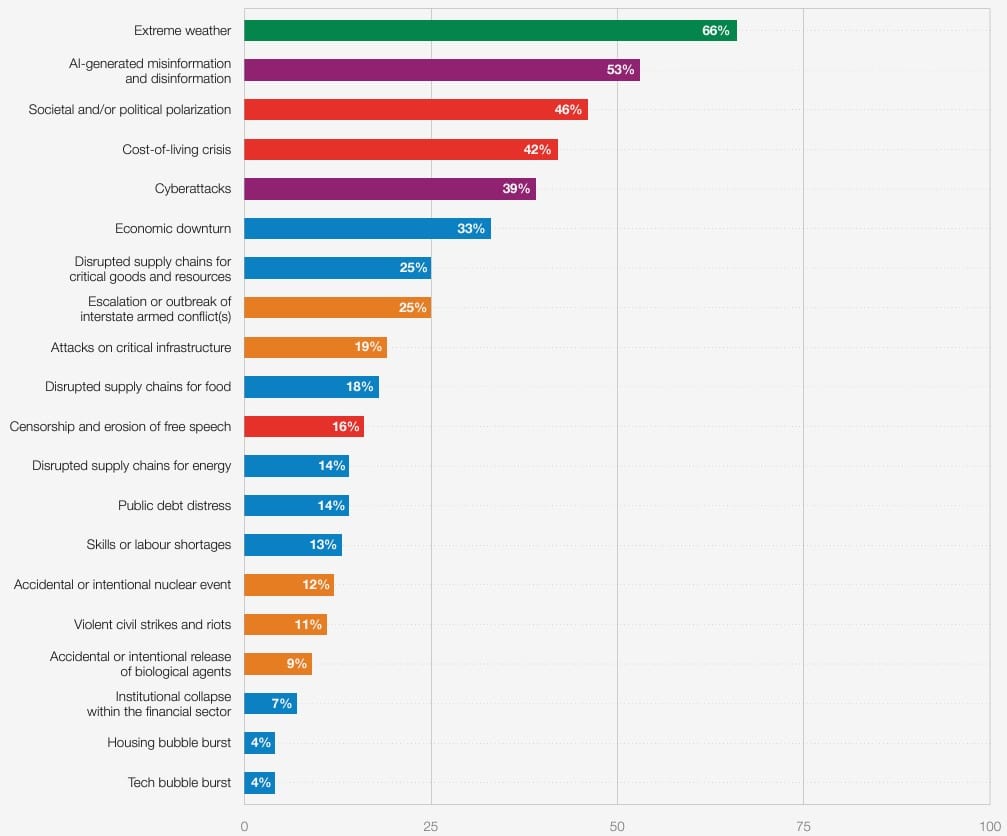
🙄 No, AI disinformation is not the biggest global threat - on the difficulty of getting a message across
AI-generated disinformation is the biggest global threat, says 1500 experts. That's nonsense.
Share this story!
How hard is it to get a political message through?
Earlier in my life, I was a politician in the city of Norrköping. At that time, the city leadership decided to spend a lot of money on renovating the large sports arena, where the football team plays.
My party opposed this. The city's finances were weak and the money was needed elsewhere, we thought.
For a couple of years, we campaigned against this. It went really well. Several front pages and full-page spreads in the newspapers, segments and debates on TV and radio. We distributed flyers in mailboxes and knocked on doors.
We got our message out many times over a long time period.
But did we get through?
In the 2010 election, I talked to a voter. Without any hint from me, she brought up the sports arena. She was really upset that the football team got so much tax payer support and healthcare, where she worked, received so little.
This vote is locked in, I thought.
Then she asked the devastating question:
"What is your stance on the renovation of the sports arena?"

We had done everything. Our message could hardly have gotten better exposure. Our opinion matched exactly with hers. An election issue she cared a lot about. And she didn't even know what we thought.
It's hard to get a political message through.
The Super Disinformation Year 2024?
Why am I writing this? Because many are now very worried about AI-generated disinformation. Especially since 2024 is a super-election year. Many countries will vote, including the U.S., EU, and India.
"We are heading towards a technology-driven Armageddon," said Nobel laureate Maria Ressa about the super election year. She particularly points out that AI makes it worse. "Without facts, there is no truth. Without truth, there is no trust," she says.
The World Economic Forum asked 1500 experts from academia, business, government, international society, and civil society how they assess global risks in the coming years. At the top of the list, they put extreme weather, and in second place AI-generated disinformation. In a two-year perspective, they place AI disinformation in first place. War comes in fifth place.

A problem, yes, but a big problem?
Of course, disinformation from AI is a problem. Moreover, a real problem, unlike fantasies about AI turning us into paperclips. But it is not necessarily a big problem. To say that it is the biggest global risk in the next two years is nonsense.
The Oxford Internet Institute, part of Oxford University, addressed this last year:
- There already exists a lot of misinformation online, but the average internet user consumes very little of it.
- Disinformation only has an impact when people see it, and most of the time, they don't.
But what if AI makes it easier to produce more disinformation and moreover of higher quality?
- Most people consume content from mainstream sources, typically the same handful of popular media outlets and are not exposed, or only very marginally exposed, to misinformation.
- Generative AI could also help increase the quality of reliable news sources—for instance, by facilitating the work of journalists in some areas.
Please read the entire thing, it is full of references to research in the field.
Everyone must stick to the facts
It is reasonable to assume that both the amount and quality of disinformation will increase, as AI makes it easier produce. But then you must get someone to see your disinformation, and there AI is at best marginally better than before. Those who see the disinformation must believe in it. And if they believe in it, it must affect their behavior.
All parts of the chain must succeed in each individual case and be repeated millions of times. Otherwise, the impact is minimal. That's not easy, regardless of how powerful generative AI is.
Nothing wrong with highlighting the problem, but turn down the rhetoric a few notches. "Without facts, there is no truth," said Maria Ressa. That's true. But everyone must stick to the facts. Even those who warn against disinformation.
Mathias Sundin
The Angry Optimist
Considering this, it is also quite interesting that extreme weather tops the risk list.
By becoming a premium supporter, you help in the creation and sharing of fact-based optimistic news all over the world.


